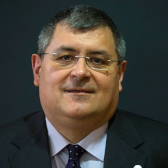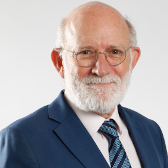
The development of Artificial Intelligence poses enormous challenges in terms of human, social and technological development. Technologies such as Cloud Computing have laid the foundations for the development of our capacity to store and process large volumes of information. Today, under the label of Big Data, this process integrates directed and non-directed machine learning technologies - Machine Learning - and underpins the development of an artificial intelligence model that we have been working on at least since Alan Turing's contributions.
The consequences of this scenario, the so-called Fourth Industrial Revolution, probably escape us. The most obvious ones are starting to be present in assisted decision models, neuromarketing, research and predictive medicine, and automated decisions in people assessment (HR Analytics), self-driving cars or in e-government can be good examples of this.
Artificial intelligence and robotics go hand in hand, auguring a future of reduced repetitive work or bureaucratic burdens, as well as a scenario of exponential growth in human capabilities.
This will undoubtedly require urgent action by the public authorities, which may or may not be materially regulatory. There is no doubt about the urgent need to define certain basic pillars that should guide public policies and regulations in the field of Artificial Intelligence:
- Place the dignity of the human being and the guarantee of fundamental rights as an insurmountable limit to the development of technology.
- Ensure accountability of persons and entities developing AI algorithms. The repeated and otherwise exhausting reflections that seek to establish a tertium genus in the legal personality of artificial intelligence and robots cannot be shared. These devices exist because someone conceived them, because someone designed and programmed them, and because someone decided to use them for a certain purpose.
- Ensure development models based on legitimately obtained data, with processes aimed at verifying their quality, and with clear duties to verify the consequences of AI use under pre-test conditions. Risk analysis and impact analysis cannot but be an unavoidable regulatory principle.
- Ensure the principle of transparency of the algorithms to be auditable. This principle will certainly have to be reconciled with the protection of scientific and industrial innovation and intellectual property, which could require the attribution of supervisory powers to independent authorities.
- Mandate traceability of systems where fundamental values such as human health, discrimination or policing are at stake. In this type of use, it must be possible to identify the decision process, the persons involved and the consequences.
- Order the nullity of any decision with legal and material consequences, and particularly of incriminating evidence, when it violates these basic principles.
- Place the guarantee of individual self-determination, of the freedom of individuals and of the collectives of which they form part as an absolutely intangible limit.
Certainly, the reader has been offered some basic ideas that should be explored further. Unfortunately, or fortunately, the human mind is limited, it cannot reach all possibilities and correlations. Fortunately, something as limited, human, low-tech - and “habermasian" - as democratic debate in the search for rational consensus is one of those things that would require a general, emotional and empathic intelligence that machines lack.
The aim of this meeting is, therefore, to serve as a point of convergence between University, Industry and Public Administration in order to create a forum for reflection and to promote the generation of a knowledge network around the discipline of Artificial Intelligence and its applications.
SPEAKERS
|
|
|
|
|
|
|
|
|
|
 |
 |
||
SCHEDULE
09.45 Opening of the Conference
- Zulima Pérez Seguí. Undersecretary of the Regional Ministry of Finance and Economic Model.
- Joaquín Aldás-Manzano. Vice-Principal, Universitat de València.
- Gabriel López Serrano. Director of Regulatory Affairs for Microsoft Ibérica.
- Ricard Martínez. Director of the Privacy and Digital Transformation Chair Microsoft-Universitat de València.
10.15 Introduction to the Conference: methodology.
- Ricard Martínez. Director of the Privacy and Digital Transformation Chair Microsoft-Universitat de València.
- M. Carmen Romero. Lecturer in the Department of Electronic Technology at the University of Seville.
10.30 Technology Panel. Notes for discussion.
- Maite Melero. General Technical Office of the Plan for the Promotion of Language Technologies (SESIAD).
- Francisco Herrera. Professor and Director of the Research Group 'Soft Computing and Intelligent Information Systems' at the University of Granada.
- M. Carmen Romero. Lecturer in the Department of Electronic Technology at the University of Seville.
12.15 Legal Panel. Notes for discussion.
- Manuel Desantes Real. Full professor of private international law at the University of Alacant.
- Ricard Martínez. Director of the Privacy and Digital Transformation Chair Microsoft-Universitat de València.
14.30 Industry and Economy Panel.
- Héctor Sánchez Montenegro. National Technology Officer of Microsoft Ibérica.
- Andrés Pedreño Muñoz. Full Professor of Applied Economics at the University of Alacant. Institute of International Economics. President of AlicanTEC
16.00 Open discussion for conclusions.
MEETINGS ON AI AND HUMAN DEVELOPMENT
The Meetings on Artificial Intelligence and Human Development were three meetings, two in 2018 and one in 2019, organized by the Microsoft Privacy and Digital Transformation Chair – University of Valencia. The meetings served to reflect and discuss about Artificial Intelligence and its impact on people in the context of the Fourth Industrial Revolution. Almost 300 experts from different disciplines participated, mainly from the fields of Law, Technology, Economics and Health.
The conclusions of these meetings were collected in the Citizen Proposal for the Commission for Social and Economic Reconstruction that was presented in the Congress of Deputies on May 9, 2020.
CVs OF SPEAKERS
Zulima Pérez Seguí
Doctor in Law with an International mention from the Universitat de València, Degree in Law from the same University and Degree in Political Science and Administration from the Miguel Hernández University. Lecturer in Constitutional Law at the Universitat de València, as well as lecturer in different master's and undergraduate degrees. She has been a collaborating lecturer at IVASPE. She has carried out research stays at the Center for Constitutional Studies and Democratic Development at the Facoltà di Giurisprudenza della Università di Bologna and the Johns Hopkins University Paul H. Nitze School of Advanced International Studies in Bologna, Italy (SAIS Europe), as well as at the Università di Padova (Italy) and at the National University of Córdoba (Argentina) at the Institute of Federalism of the National Academy of Law and Social Sciences of Córdoba.
Joaquín Aldás-Manzano
Doctor in Economics and Business Studies, Universitat de València, he is a full professor of Marketing and Market Research at the Faculty of Economics of the Universitat de València, Ivie Research Fellow and Visiting Research Fellow at the University of Glasgow (UK). He is co-director of the U-Ranking university ranking, produced by the Ivie and the BBVA Foundation. His main fields of specialisation are quantitative marketing research methods. His research has been published, among others, in the European Journal of Marketing, Journal of Services Marketing, Online Information Review, Journal of Business Ethics, Journal of Interactive Marketing and Tourism Management. He is co-author of the book Applied Multivariate Analysis (Thomson, 2005) and Applied Multivariate Analysis with R (Paraninfo, 2017).
Gabriel López Serrano
He is a member of the Madrid Bar Association and holds a Master's degree in Administrative Law and Regulation. He also has postgraduate studies at the Instituto de Empresa in Madrid, the European Academy of Law in Trier, Germany, Georgetown University, USA, and the Instituto Tecnológico Autónomo de México, Mexico City. Gabriel currently works at Microsoft as a Lawyer and Director of Public Policy for Spain and participates in various academic projects at the Universitat de València and the Foundation for Research on Law and Business (FIDE). He has written articles on the use of artificial intelligence in regulatory design and accessibility. He has recently been appointed president of Digital Policy for AMETIC (the employers' association representing the digital technology industry in Spain).
Ricard Martínez Martínez
Doctor in Law from the Universitat de València, he has devoted his research to the study of the fundamental right to data protection and to different issues related to the impact of information and communication technologies on private life. He currently works at the Universitat de València as Assistant Professor in the Department of Constitutional Law, Political Science and Administration. He is a member of the Working Group on Citizens' Digital Rights of the Ministry of Energy, Tourism and Digital Agenda. He coordinates the Working Group set up by the Conference of Rectors of Spanish Universities (CRUE-TIC) to promote the General Data Protection Regulation.
Mari Carmen Romero Ternero
Doctorate from the University of Seville (2005), Computer Engineer (1999), Official Master's Degree in Business Organisation and Management (2008) and Expert in IT Service Management in Universities (2015). She is currently Associate Professor in the Department of Electronic Technology of the University of Seville, in the School of Computer Engineering. In the field of research, she belongs to the Research Group Electronic Technology and Industrial Computing (TIC150) since 1999, working in the area of Artificial Intelligence applied to different fields, from Industrial to Health and Welfare.
Maite Melero
Senior researcher ascribed to the NLP Research Group of the Universitat Pompeu Fabra and holds a Phd in Applied Linguistics. She is currently advising the Secretaria de la Sociedad de la Información y la Agenda Digital (SESIAD) in the deployment of the Plan de Impulso de las Tecnologías del Lenguaje. This Plan aims at promoting the language technology industry by using the Spanish Administration as a driver for market demand. She is also involved in two EU-funded projects under the auspices of the Connecting Europe Facility network, aiming at the development of technological resources and tools for the multilingual Europe. Her expertise in the fields of Natural Language Processing and Machine Translation is extensive and includes both academic and industrial experiences. Among other things she was responsible for the implementation of the Spanish Grammar Checker in Microsoft Office. She is the author of the volume for Spanish in the META-NET’s White Paper series on Language in the Digital Age, intended to raise awareness for the language technologies in Europe, as well as the 2017 study, commissioned by the European Parliament, of the current situation of Language Technologies and their implications on the configuration of the Digital Single Market in a multilingual Europe.
Francisco Herrera
Francisco Herrera has developed his professional career in the Dept. of Computer Science and Artificial Intelligence at the University of Granada, where he is a full professor since April 2005. He directs the Andalusian Interuniversity Institute in Data Science and Artificial Intelligence. He has supervised 42 doctoral theses and published more than 400 articles in international scientific journals in the field of artificial intelligence. He is a senior editor of two international journals, "Information Fusion" (Elsevier), and "Progress in Artificial Intelligence" (Springer). He is a member of the editorial board of more than a dozen international journals. He has published several scientific books, and the popular science book: "Inteligencia Artificial, Inteligencia Computacional y Big Data Servicio”.
Manuel Desantes Real
Full professor of private international law at the University of Alacant since 1992. He was Vice-President of the European Patent Office (Munich) from 2001 to 2008, Vice-Rector and acting Rector of the University of Alacant from 1996 to 1998 and member of the Legal Service of the European Commission from 1998 to 2001. He is currently a member Of Counsel of the firm ELZABURU, Vice-President of the Spanish Design Jury, Member of the Eisenhower Foundation, Member of the Board of the AlicanTEC Association, Member of the Board of the UNICEF Committee for the Valencian Community, Member of the Board of Trustees of the Auditorium Foundation of the Provincial Council of Alicante ADDA and Member of the Advisory Board of the Alberto Elzaburu Foundation, among others. He has published seven books and more than seventy research papers.
Héctor Sánchez Montenegro
He holds a degree in Physics from the Universidad Autónoma de Madrid, and currently holds the position of Chief Technology Officer at Microsoft Ibérica, a company in which he has held various positions such as Director of Security and Director of Pre-Sales Engineering. He is co-author of Manuals on Data Protection in Microsoft technologies, author of numerous articles in technology sector magazines, and leads some of the most relevant initiatives for Microsoft, such as the signing of strategic security agreements with the National Intelligence Centre and Incibe, the certification and accreditation of Microsoft Cloud environments against the National Security Scheme or Microsoft's Artificial Intelligence strategy. He currently chairs the OSAC (Overseas Security Advisory Council) committee of the US Embassy in Spain.
Andrés Pedreño Muñoz
He holds a degree in Economics and Business Studies from the Universitat de València (1978) and a doctorate from the University of Alacant. He was awarded the MEC National Prize for the Best Scholarship Holders, the Extraordinary Degree Prize from the Universitat de València and the Extraordinary Doctorate Prize from the University of Alacant. He developed his teaching and research career at the latter university, through its Chair of Applied Economics since 1989. Since 2005 he has been a director of Universia, a life member of the Board of Trustees of the Miguel de Cervantes Virtual Library, director of the Higher Council of Statistics (2004-2009) and a member of the Advisory Council for Electronic Administration of the Ministry of Public Administration. He is also a member of the International Committee at the International Science Foundation. He is a corresponding member of the Royal Academy of Moral and Political Sciences in Spain, and of the American Academy of Language in the United States. He holds an honorary doctorate from Nottingham Trent University (UK) for his defence of university autonomy, among other awards.
















